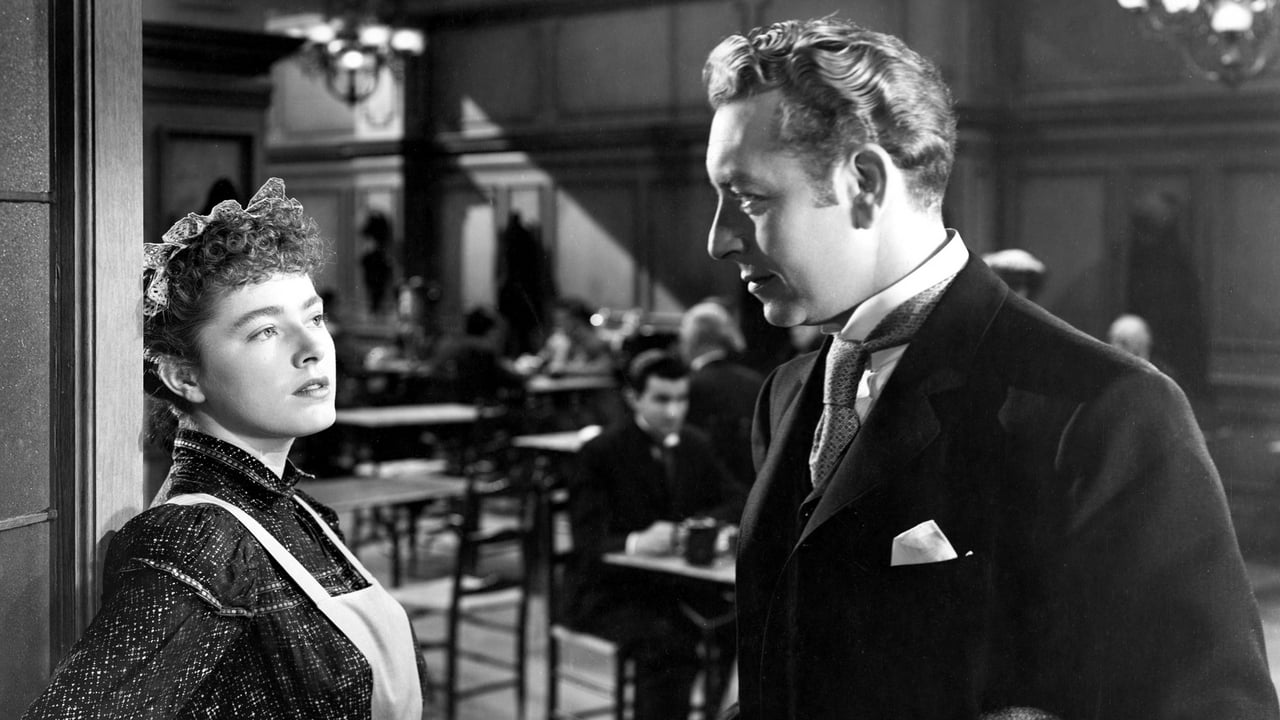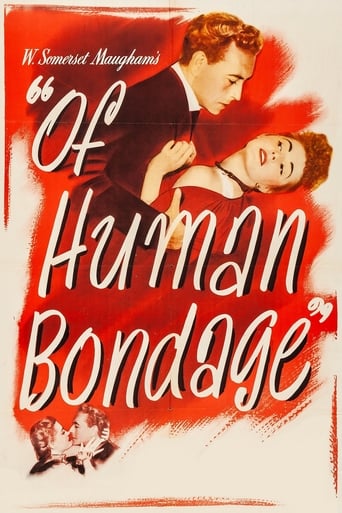

Excellent but underrated film
... View MoreI think this is a new genre that they're all sort of working their way through it and haven't got all the kinks worked out yet but it's a genre that works for me.
... View Morewhat a terribly boring film. I'm sorry but this is absolutely not deserving of best picture and will be forgotten quickly. Entertaining and engaging cinema? No. Nothing performances with flat faces and mistaking silence for subtlety.
... View MoreThis is one of the best movies I’ve seen in a very long time. You have to go and see this on the big screen.
... View More"Of Human Bondage" (1946) is a moody tale of romantic obsession, set in Victorian England. Philip is a sensitive gentleman who becomes passionately obsessed with Mildred, a beautiful lower-class vixen who is selfish and ill-tempered. The film is based on the classic novel by W. Somerset Maugham.There are five reasons why the 1946 movie is the best version. First, Eleanor Parker is perfect as Mildred, the beautiful, shrill vixen. Second, the film is set in the late 1800s and has Victorian costumes and sets. Third, the lighting of the night scenes is dark and moody. Fourth, the musical score is excellent. Fifth, the film was directed by Edmund Goulding, known for his elegant and refined films. He directed classics including "Grand Hotel" (1932), "Dark Victory" (1939) and "The Razor's Edge" (1946).Other versions of "Of Human Bondage" include the famous 1934 version with Bette Davis, and a 1964 version. The 1934 version was set in the 1930s.The 1946 film has great atmosphere, with Victorian costumes and sets. Horse-drawn carriages travel along the cobblestone streets. Women wear elegant gowns with hats. Philip and Mildred spend a gloomy, misty day at Brighton beach. The entrance to the elaborate amusement pier is shown in the background.Mildred's costumes are in a tawdry-chic glamour style. Her jackets, skirts and hats do not match, and are decorated with sequins and feathers.The lighting is generally dark. Most of the scenes occur at night. There is high contrast between dark and light. The narrow, dark cobblestone streets are lit with gaslights. In one scene, Mildred appears in a tiny bright window wearing a black gown, looking out at the vast night. The darkness of the scenes gives the film a moody look.Eleanor Parker gives a superb performance as Mildred. She is alternately flirtatious and mean-spirited, and is prone to shrill outbursts of anger. Paul Henreid is also excellent as Philip, the gentleman who loves the wrong woman.The film begins in the Latin Quarter of Paris in 1897, at an artists' masquerade ball. One partygoer wears a skeleton costume, which is symbolic of death. Philip lives in an artist's garret. He is morose, because he wanted to be an artist, but his art instructors informed him that he is not talented. Philip leaves for London to attend medical school, and moves into a Victorian flat.Philip is a gentleman who is looking for passionate love. He is not charming or handsome, and is afflicted with a clubfoot, but he is kind, intelligent and well-mannered.When Philip meets Mildred working as a waitress at a Victorian tavern, he is completely obsessed, and wants to marry her. However, she does not love him, and is often scornful and derisive to him. Mildred consistently chooses the wrong men, handsome charmers who use her and then leave.Nora Nesbit (Alexis Smith) is an accomplished writer, and she loves Philip. However, she is too ambitious for Philip, and she does not understand his love of art.Mildred's affairs with other men makes Phillip's passion grow cold. When Mildred becomes pregnant and is abandoned by a callous lover, she resorts to prostitution to survive. Philip feels sorry for her, and tries to help her by giving her room and board, in exchange for domestic duties.There is a dramatic scene on Christmas Eve. Philip plans to spend Christmas with his friends, the Athelny family, instead of with Mildred. When Philip rejects her romantic advances, she becomes enraged. In a whirlwind of fury, Mildred screams as Philip departs, wrecks his apartment, burns his money and leaves.Philip later hears the tragic news that Mildred and her baby are dying. He sadly visits Mildred in the hospital. When Mildred dies, Philip's strange obsession also dies.In the springtime, Philip finds true happiness with the Athelny family, and plans to marry their young, proper daughter Sally. He has found joy in marriage, work and family.This film has interesting themes. Romantic obsession. Unrequited love. Social class structure. Falling in love with the wrong person. The tragic consequences of bad choices and selfishness. The happiness of family.The 1946 film "Of Human Bondage" has been underrated, and deserves more recognition. This movie has excellent acting, outstanding Victorian sets and costumes, moody night lighting, a great musical score, and skillful directing by Edmund Goulding. It should be on DVD. Highly recommended.
... View MoreA lot of people must not have read the book. None of the versions of this movie is close to the book simply because Mildred does not even show up in the book until the middle. She is a important character but not the main character. I believe people misread the Philip character because they leave so much out about his life before he met met Mildred. And there is the flaw of all of the versions. Someone mentioned that Bette Davis was not pretty enough for Philip to be obsessed with. Well in the book it mentions she was not pretty. Actually Davis is the one character out of all of the versions that comes close to the character in the book. The way he describes Mildred is the way Davis looks to a tee.In the book Philip was not a nice guy. He had a chip on his shoulder because of his foot and he treated people badly. He treated the family with contempt who took him in as a child. He would make nasty remarks about people who wanted to befriend him. One woman even commits suicide over him. We see none of this in the movie. So I see Mildred differently. And his obsession makes sense because of the book. He is not the sympathetic man we see in the movie.I believe Henried is better in the role then Howard. Parker is way too pretty for the Mildred part. Even though she is a good actress here her good looks get in the way. Henreid is age appropriate for the film because in the book he took a lot of years off discovering what he wanted to do. He even spent time in Germany. Sally is the character that betrays the book the most. In the book she much more outgoing and she sleeps with Philip even though were just good friends. She was the only woman in the book that Philip had a relationship with that he did not destroy even though he almost did. I like Janis Paige in the role. I believe this is a better version then the 34 version, even though Davis is better in the Mildred role. But once again I must mention if people are looking for something that is close to the book none of the versions are.
... View MoreI do not think this is a movie about love. It is a movie that compares and contrasts MANY human emotions that hold us in bondage - most notably, love and obsession. I pity people who think that what Philip (Henreid) feels for Mildred (Parker) is LOVE! Of the 3 versions of this Somerset Maugham tale, this one is the strongest. Bette Davis' performance in the original may have been groundbreaking, but neither the film nor her performance is great. Davis' performance leaves indelible impressions; it earns my respect and admiration. However, it is not very nuanced; she is nothing but a shrew. Also, she is simply not pretty enough to inspire Philip Carey's obsession with Mildred. The original film and the portrayal by Davis are classic not because they are great, but because they are groundbreaking.For my money, both of the remakes are better movies. Eleanor Parker and Kim Novak both portray a Mildred who is prettier and less shrewish - and consequently more believable. Mildred becomes both more understandable and more pathetic. Also, because they are both prettier than Davis, obsession with either one of them is a great deal more conceivable. Also, I like Paul Henried in this version much better than Leslie Howard (or Laurence Harvey). He may not be as sensitive or intellectual, but neither is he nearly as weak. I think a woman is more likely to feel sympathy or pity for Howard, NOT love. Henried seems much more "lovable." After all, 2 women actually do love Philip!I am a big fan of many character actors of the 30's and 40's, including Edmund Gwenn. This is a great Edmund Gwenn role, and his presence is a real plus for this version.Although her appearance is brief, I also love the beautiful, sympathetic Alexis Smith.The neat surprise for me in this version is Janis Paige. I didn't really notice her until this, my 2nd or 3rd viewing, but it is fun seeing her as such a young actress in this very wholesome role. One of her more memorable roles is the blonde vamp who is first insulted by David Niven and then tries to seduce him in Please Don't Eat the Daisies.But for me Eleanor Parker steals the show. I barely recognized her as a brunette. Neither had I ever seen her play such a loathsome character. Seeing her display such range was fun. Plus her performance is far superior to Bette Davis' in the original.
... View MoreOF HUMAN BONDAGE attempts to be an accurate re-telling of the Somerset Maugham novel set in the Victorian period (instead of modern times as in the Bette Davis-Leslie Howard '34 version). But there are some drastic gaps in the script that tend to omit scenes that are only talked about or used as exposition. For example, Philip's sighting of Mildred as a street-walker is only mentioned; her illness is never shown graphically (as it was in the Bette Davis version) and we see only the back of her head as she lies in a hospital ward. Other key scenes are dismissed in a few lines of dialogue instead of being portrayed. And the weaknesses don't end there. Edmund Gwenn is much too cheery as Philip's friend, playing him as though he is the father again in 'Pride and Prejudice' pushing his young daughter (Janis Paige) toward him in scene after scene. And Paige herself is notably miscast as a virginal English lass. Alexis Smith is totally wasted in a few brief scenes. Patric Knowles doesn't bring much credibility to the role of Philip's doctor friend.And then there are the two central performances: Eleanor Parker and Paul Henried. Miss Parker puts too much effort into her role and is uglified so that she looks the role of a low-class hussy but it seems more like a self-conscious acting job than anything else. Her Mildred is contemptuous in her willful actions (like demolishing Philip's apartment when in a tantrum) and to her credit she never tries to create sympathy for the character she portrays--but never really seems to be the cheap tart she portrays. Ida Lupino would have made a much more convincing Mildred with much less effort. Paul Henried plays his role with sensitivity but is clearly too old to play the young medical student.The entire film has a dark, claustrophobic look that isn't helped by the low-key lighting of rainswept streets and dark alleys nor the interior set decorations of humble lodgings. For a really better understanding of the story, read the original novel. It's quite fascinating. A quality note of distinction is the underlying mood music of Erich Wolfgang Korngold that should have accompanied a much better film.
... View More